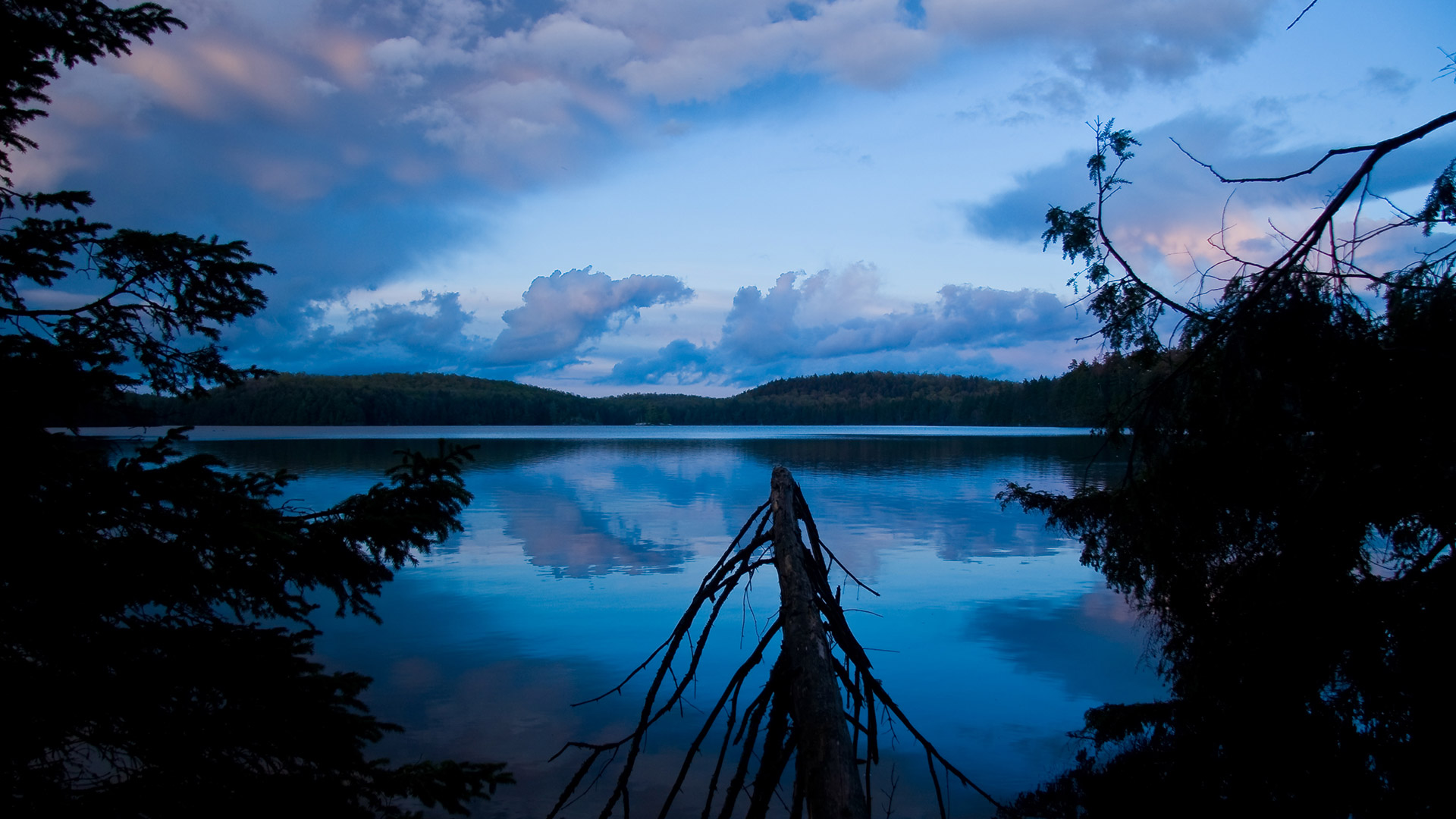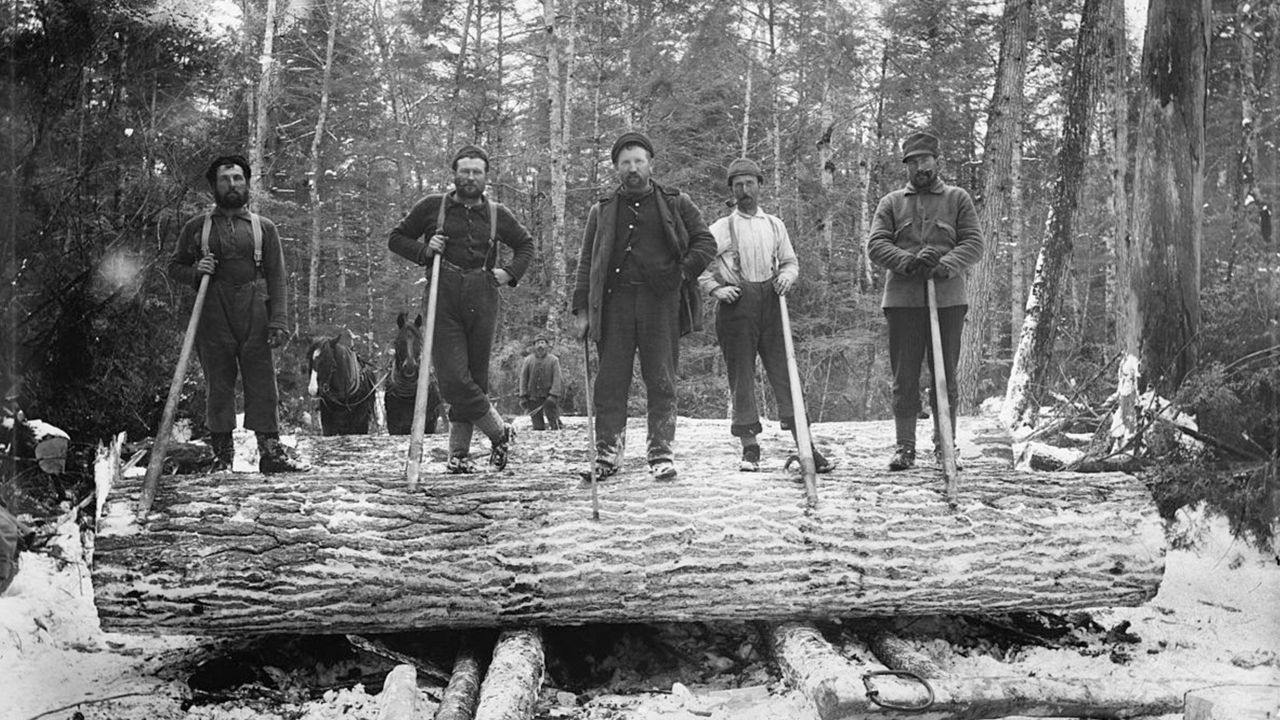REFLECTIONS ON ALGONQUIN
A retreat from the 21st century leaves James Brown pondering the beauty in getting off the grid

The osteopath who was folding me up like a deck chair so I’d be fit and ready for whatever the woods and lakes of Ontario could throw at me looked in disbelief, “You’re going to Algonquin? I’ve been there, the first thing you see when you come into the park is this amazing outdoors shop with everything.”
I figured there’d be lots of entrances to this massive natural park in Ontario but when we pull into the park there is indeed this amazing outdoors shop. It’s name is on the side of an old-fashioned pick-up truck that’s piled high with canoes on top of it.
There are five of us and our guide, Robin Bannerjee from Call of The Wild adventure tours, our intention is to spend the best part of a week in the forests and lakes, canoeing and camping.
UNLOADING THE WEIGHT OF THE WORLD

We have travelled all the way from London by plane and automobile to go back in time, leave technology behind, and paddle and float about the lakes of Algonquin on giant Kevlar Evergreen canoes. The experience is called portage from the French verb to carry. There’s no whitewater because it’s lakes not rivers, but there will be one unusual challenge.To get from each lake to the next you are required to tip these huge canoes upside down and carry them on your shoulders. The canoes come with a specially fashioned wooden cross bar that is essentially the same sort of yoke you see milk maidens use when carrying heavy churns in kids storybooks. Although it doesn’t look like it, the Portage-ing is a one-man job. You have your mate hold the canoe tip up high then you edge backward under it until the yoke is across your shoulders. Then, you tighten your stomach muscles and step up, very very tentatively, until you develop a pace and eventually become accustomed to the nature of the walk.Up muddy slopes and along occasional decking, it’s a challenge to the mind as much as the body. For those of us that toil at keyboards, the half mile walks from lake to lake, and the immediate return for the bags with the camping equipment, offer a tiny glimpse of real-world work.The rest of the travel isn’t so much a walk in the park as a paddle in the pond. The wind can whip up some slight choppiness but nothing to worry you about. They are two man canoes, and you can make fair headway.Soon it becomes a challenge not to believe that out with nature is where we are supposed to be. Floating in all nature’s stillness. Watching the day turn to dusk. Knowing your life is slowly doing the same. Out here on Pen Lake, Algonquin, you go at nature’s pace not our own, and we’re all the better for it.
"At closer inspection the ground certainly looks flatter than most of the lakeside. He goes on to explain that these woods were directly involved in the rise of the British Empire."
To the determined city dweller, there is nothing here. There are no cash machines, phone chargers, taxis, televisions, iPads, bars or shops. No petrol, no gas, no alcohol, no radio, no noise. And yet there is everything. There’s peace and tranquility. There’s thousands of years of natural history. There’s an industry that built the British Empire then disappeared. There are elk and bears and wolves out there somewhere. And there’s a clutch of red trees amid the green that looks like a jigsaw piece in the wrong puzzle. I have sat leaning back on a canoe like this in the English Channel, but it has none of the power the forests of hemlock, balsam spruce, white birch, maple and white pine give Algonquin. When we paddle off from lake to lake, down beaver streams and across huge bays with rock walls, it’s the red jigsaw piece tree that’s my marker to say there’s just 40 minutes of paddling back to the camp.
“Turn left at the rock,” we laugh. “And then up the inlet to the bank and carry the canoe through another forest and repeat.” It feels like nothing has happened here, but we are wrong. Coming across a small weir that is clearly man-made, Robin suggests we climb out onto what looks like a very small wharf.
“Believe it or not,” he says, “Where we are standing was once Canada’s busiest railway station. A fully loaded engine would leave every seven minutes — such was the rate of harvesting the logs.”
We look around. We are on the edge of a forest with a massive lake behind us; he’s clearly gone nuts. There’s no railway station to be seen — no rails, no buildings, nothing. There’s definitely signs that man has been there, The weir has a man-made slope and the thing we’re standing on looks like its made from fashioned rock. But beyond that, there’s nothing. At closer inspection of the ground certainly looks flatter than most of the lakeside.
He goes on to explain that these woods were directly involved in the rise of the British Empire.
THE FATE THAT BEFELL ALGONQUIN
"How one Canadian forest powered an empire’s fleet."
After defeating Napoleon at the start of the 19th century, the British needed to rebuild their fleet to allow them the seapower to build the empire. While fighting the French in what became Canada, they found the Algonquin Forest and declared it would provide timber for a thousand years. The huge white pine trees made for perfect ship masts, and they set to inventing the modern logging industry. Within 40 years, the forest was spent. And so they began to replant and would revisit every 40 years.
What followed was the hard-bitten heyday of logging and lumberjacks. Young men driven by poverty to live two to a bunk in small hovels, sewn into their underwear until the sweat and toil rotted them off, working 18-hour days until the snow stopped them. Then, starting up again after the ice thawed.
Once we are aware of its industrial past we start to see the odd trace of this hard-bitten industry. The odd iron link nailed into a rockface on a fast waterway. A cleaned log lying half submerged or stuck by a waterfall. In Alberta, a smart diving company has begun recovering the lost logs for orders from designers and architects, as the cold lakes have preserved them perfectly.
ON THE OUTSIDE LOOKING IN

"There is no 21st-century entertainment here, just the opportunity to stand on a pebbled beach and stare up at the skies full of stars and howl."
After a day of paddling and portaging, when the others are lighting a camp fire, I push the Kevlar Evergreen canoe off the stone beach and float backward toward the middle of the lake. There’s 38 minutes of daylight left, and that’s enough time to float off and away into the middle of nowhere. The sun’s almost gone but there’s still enough warmth in the day to go out in a T-shirt and life jacket. If you think all canoeing is white water and rage, think again. This is the stillest place I’ve been on Earth.
On the shore, I can hear the boys laughing and joking about wolves and bears, their humour crackling with inner-city paranoia. Their voices bounce across the lake. This lake, Pen Lake, like so many others in Algonquin Park, is a huge rippling space under siege from forests. A third of the Earth’s still water is in Canada, and a paddle is gently steering me deeper into it. The setting is an area that’s steeped in industrial and ecological history. What appears to now be pure nature was once the heart of pure industry. After just three days away camping and paddling, it feels like we have been away for weeks. We constantly see grey lake and green banks — no mirrors, no media, no neon, no sharp edges, just solitude and water and leaves. The trees that surround us look amazing, bursting into reds and ochres and limes.
We’ve been paddling and carrying these huge hefty canoes on our shoulders for three days. So much so that it now seems strange just to lie back and drift and listen and look around. There is no 21st-century entertainment here, just the opportunity to stand on a pebbled beach and stare up at the skies full of stars and howl. And double up in laughter when one man’s wolf call is another man’s bad Kenneth Williams impression.

The 18 Most Eccentric Museums in America
So you've done MoMA and The Smithsonian? Now it's time to take to the road and check out these weird and wonderful museums scattered across the states.
14 Places to Improve Yourself
Hang on to those run-of the-mill New Year's resolutions. Here's a list of tantalizing alternatives you won't be giving up on so easily.

